Report on Information Systems and Associated Ethical Issues Analysis
VerifiedAdded on 2020/04/21
|7
|1394
|122
Report
AI Summary
This report analyzes the ethical, social, and political issues arising from the use of information systems, examining topics such as privacy, intellectual property, and cybercrime. It explores the impact of automation and technological advancements on society, including the loss of expertise and the challenges of protecting sensitive information. The report references Nicholas Carr's "Glass Cage" to discuss the reliance on computers, complacency, and biases that affect decision-making. It also considers potential solutions, such as promoting learning and engagement by returning control to operators. The report highlights the interconnectedness of ethical, social, and political issues within organizations and the broader societal context, emphasizing the need for careful consideration of the implications of information technology.
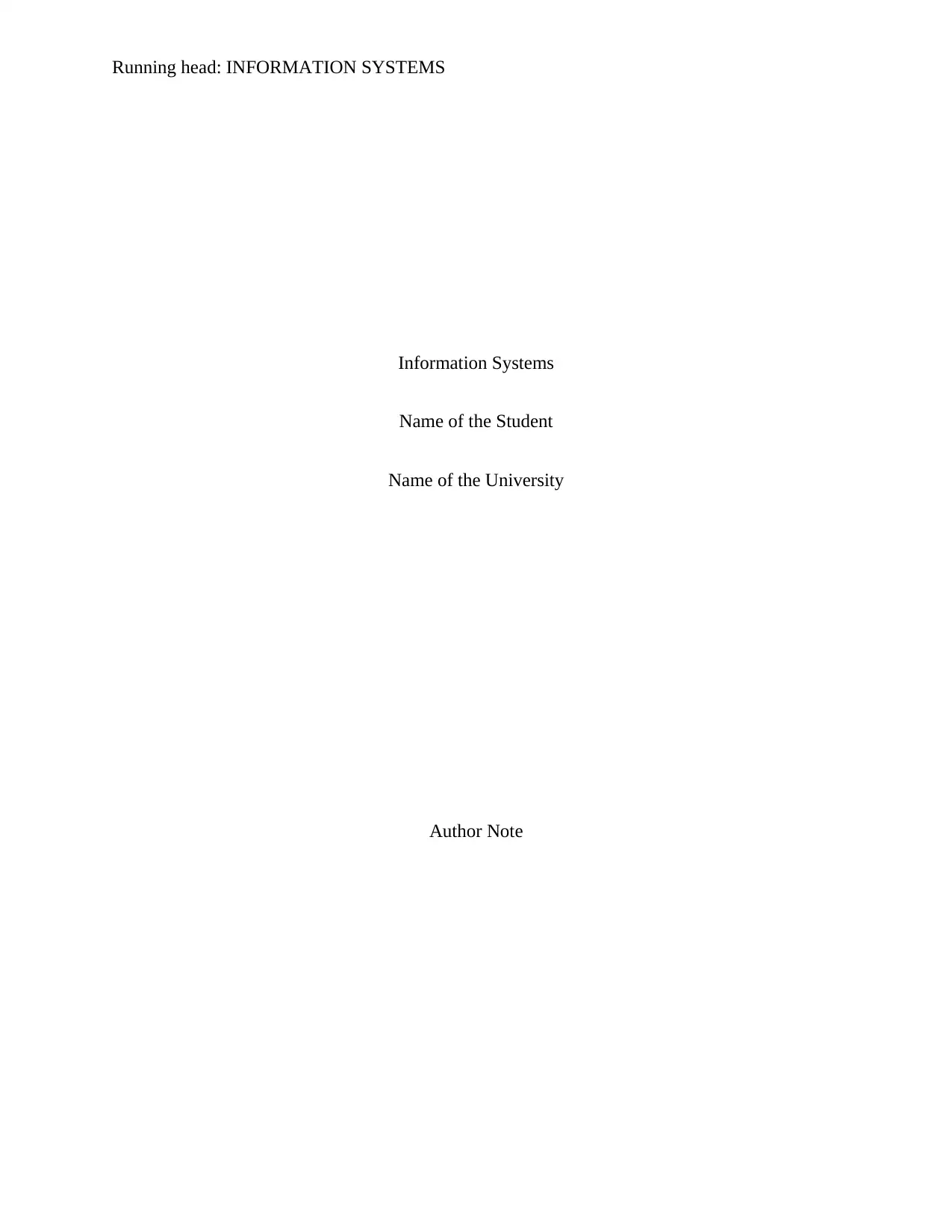
Running head: INFORMATION SYSTEMS
Information Systems
Name of the Student
Name of the University
Author Note
Information Systems
Name of the Student
Name of the University
Author Note
Paraphrase This Document
Need a fresh take? Get an instant paraphrase of this document with our AI Paraphraser
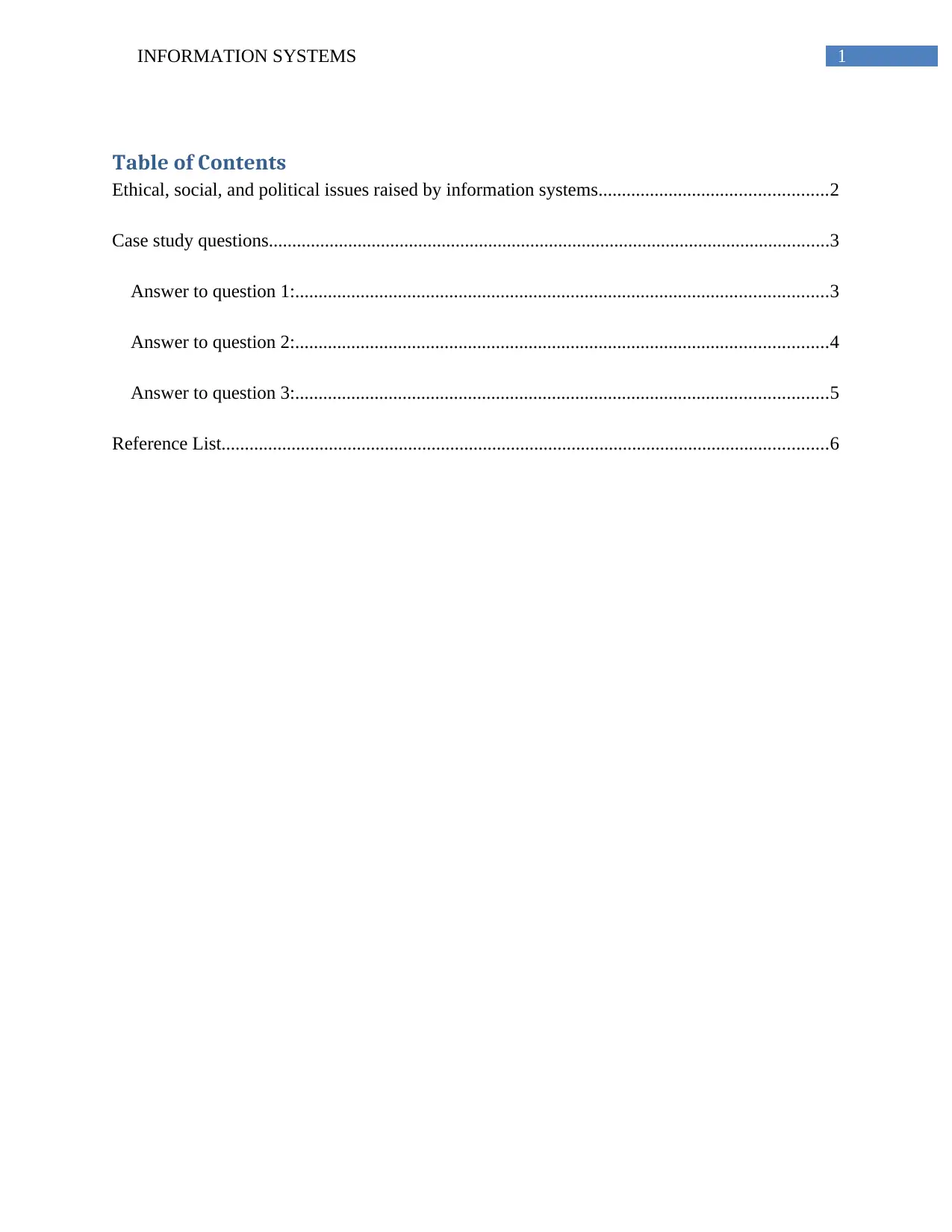
1INFORMATION SYSTEMS
Table of Contents
Ethical, social, and political issues raised by information systems.................................................2
Case study questions........................................................................................................................3
Answer to question 1:..................................................................................................................3
Answer to question 2:..................................................................................................................4
Answer to question 3:..................................................................................................................5
Reference List..................................................................................................................................6
Table of Contents
Ethical, social, and political issues raised by information systems.................................................2
Case study questions........................................................................................................................3
Answer to question 1:..................................................................................................................3
Answer to question 2:..................................................................................................................4
Answer to question 3:..................................................................................................................5
Reference List..................................................................................................................................6
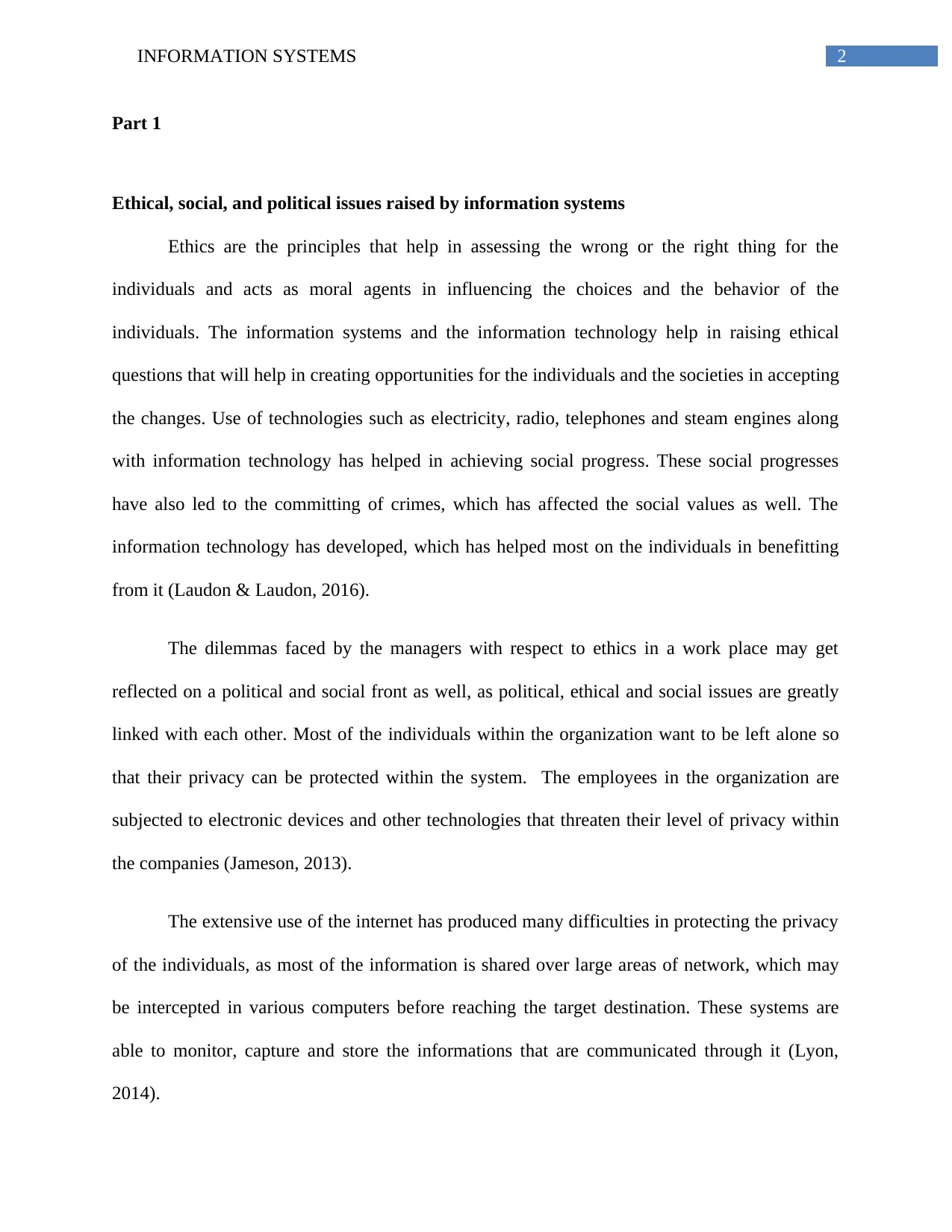
2INFORMATION SYSTEMS
Part 1
Ethical, social, and political issues raised by information systems
Ethics are the principles that help in assessing the wrong or the right thing for the
individuals and acts as moral agents in influencing the choices and the behavior of the
individuals. The information systems and the information technology help in raising ethical
questions that will help in creating opportunities for the individuals and the societies in accepting
the changes. Use of technologies such as electricity, radio, telephones and steam engines along
with information technology has helped in achieving social progress. These social progresses
have also led to the committing of crimes, which has affected the social values as well. The
information technology has developed, which has helped most on the individuals in benefitting
from it (Laudon & Laudon, 2016).
The dilemmas faced by the managers with respect to ethics in a work place may get
reflected on a political and social front as well, as political, ethical and social issues are greatly
linked with each other. Most of the individuals within the organization want to be left alone so
that their privacy can be protected within the system. The employees in the organization are
subjected to electronic devices and other technologies that threaten their level of privacy within
the companies (Jameson, 2013).
The extensive use of the internet has produced many difficulties in protecting the privacy
of the individuals, as most of the information is shared over large areas of network, which may
be intercepted in various computers before reaching the target destination. These systems are
able to monitor, capture and store the informations that are communicated through it (Lyon,
2014).
Part 1
Ethical, social, and political issues raised by information systems
Ethics are the principles that help in assessing the wrong or the right thing for the
individuals and acts as moral agents in influencing the choices and the behavior of the
individuals. The information systems and the information technology help in raising ethical
questions that will help in creating opportunities for the individuals and the societies in accepting
the changes. Use of technologies such as electricity, radio, telephones and steam engines along
with information technology has helped in achieving social progress. These social progresses
have also led to the committing of crimes, which has affected the social values as well. The
information technology has developed, which has helped most on the individuals in benefitting
from it (Laudon & Laudon, 2016).
The dilemmas faced by the managers with respect to ethics in a work place may get
reflected on a political and social front as well, as political, ethical and social issues are greatly
linked with each other. Most of the individuals within the organization want to be left alone so
that their privacy can be protected within the system. The employees in the organization are
subjected to electronic devices and other technologies that threaten their level of privacy within
the companies (Jameson, 2013).
The extensive use of the internet has produced many difficulties in protecting the privacy
of the individuals, as most of the information is shared over large areas of network, which may
be intercepted in various computers before reaching the target destination. These systems are
able to monitor, capture and store the informations that are communicated through it (Lyon,
2014).
⊘ This is a preview!⊘
Do you want full access?
Subscribe today to unlock all pages.

Trusted by 1+ million students worldwide
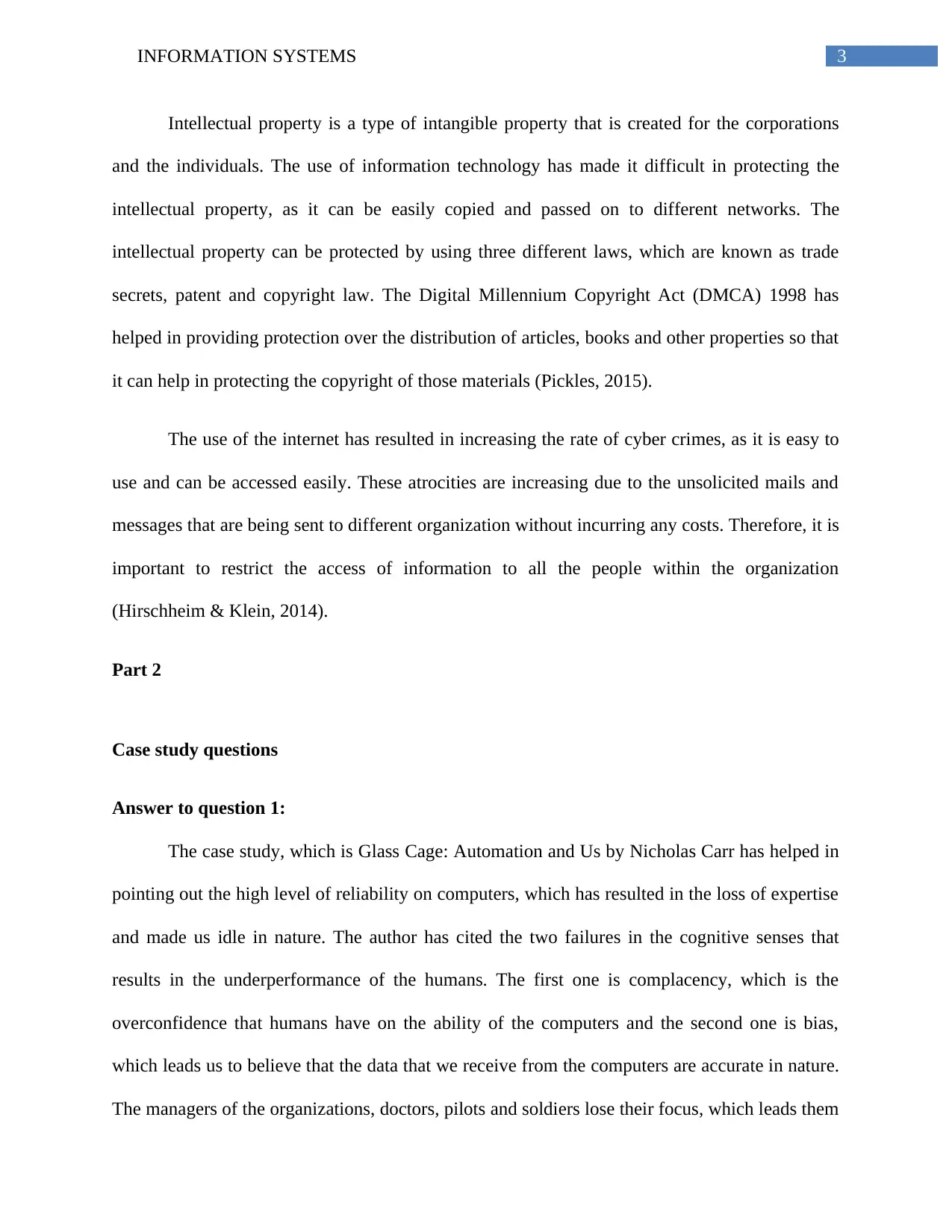
3INFORMATION SYSTEMS
Intellectual property is a type of intangible property that is created for the corporations
and the individuals. The use of information technology has made it difficult in protecting the
intellectual property, as it can be easily copied and passed on to different networks. The
intellectual property can be protected by using three different laws, which are known as trade
secrets, patent and copyright law. The Digital Millennium Copyright Act (DMCA) 1998 has
helped in providing protection over the distribution of articles, books and other properties so that
it can help in protecting the copyright of those materials (Pickles, 2015).
The use of the internet has resulted in increasing the rate of cyber crimes, as it is easy to
use and can be accessed easily. These atrocities are increasing due to the unsolicited mails and
messages that are being sent to different organization without incurring any costs. Therefore, it is
important to restrict the access of information to all the people within the organization
(Hirschheim & Klein, 2014).
Part 2
Case study questions
Answer to question 1:
The case study, which is Glass Cage: Automation and Us by Nicholas Carr has helped in
pointing out the high level of reliability on computers, which has resulted in the loss of expertise
and made us idle in nature. The author has cited the two failures in the cognitive senses that
results in the underperformance of the humans. The first one is complacency, which is the
overconfidence that humans have on the ability of the computers and the second one is bias,
which leads us to believe that the data that we receive from the computers are accurate in nature.
The managers of the organizations, doctors, pilots and soldiers lose their focus, which leads them
Intellectual property is a type of intangible property that is created for the corporations
and the individuals. The use of information technology has made it difficult in protecting the
intellectual property, as it can be easily copied and passed on to different networks. The
intellectual property can be protected by using three different laws, which are known as trade
secrets, patent and copyright law. The Digital Millennium Copyright Act (DMCA) 1998 has
helped in providing protection over the distribution of articles, books and other properties so that
it can help in protecting the copyright of those materials (Pickles, 2015).
The use of the internet has resulted in increasing the rate of cyber crimes, as it is easy to
use and can be accessed easily. These atrocities are increasing due to the unsolicited mails and
messages that are being sent to different organization without incurring any costs. Therefore, it is
important to restrict the access of information to all the people within the organization
(Hirschheim & Klein, 2014).
Part 2
Case study questions
Answer to question 1:
The case study, which is Glass Cage: Automation and Us by Nicholas Carr has helped in
pointing out the high level of reliability on computers, which has resulted in the loss of expertise
and made us idle in nature. The author has cited the two failures in the cognitive senses that
results in the underperformance of the humans. The first one is complacency, which is the
overconfidence that humans have on the ability of the computers and the second one is bias,
which leads us to believe that the data that we receive from the computers are accurate in nature.
The managers of the organizations, doctors, pilots and soldiers lose their focus, which leads them
Paraphrase This Document
Need a fresh take? Get an instant paraphrase of this document with our AI Paraphraser
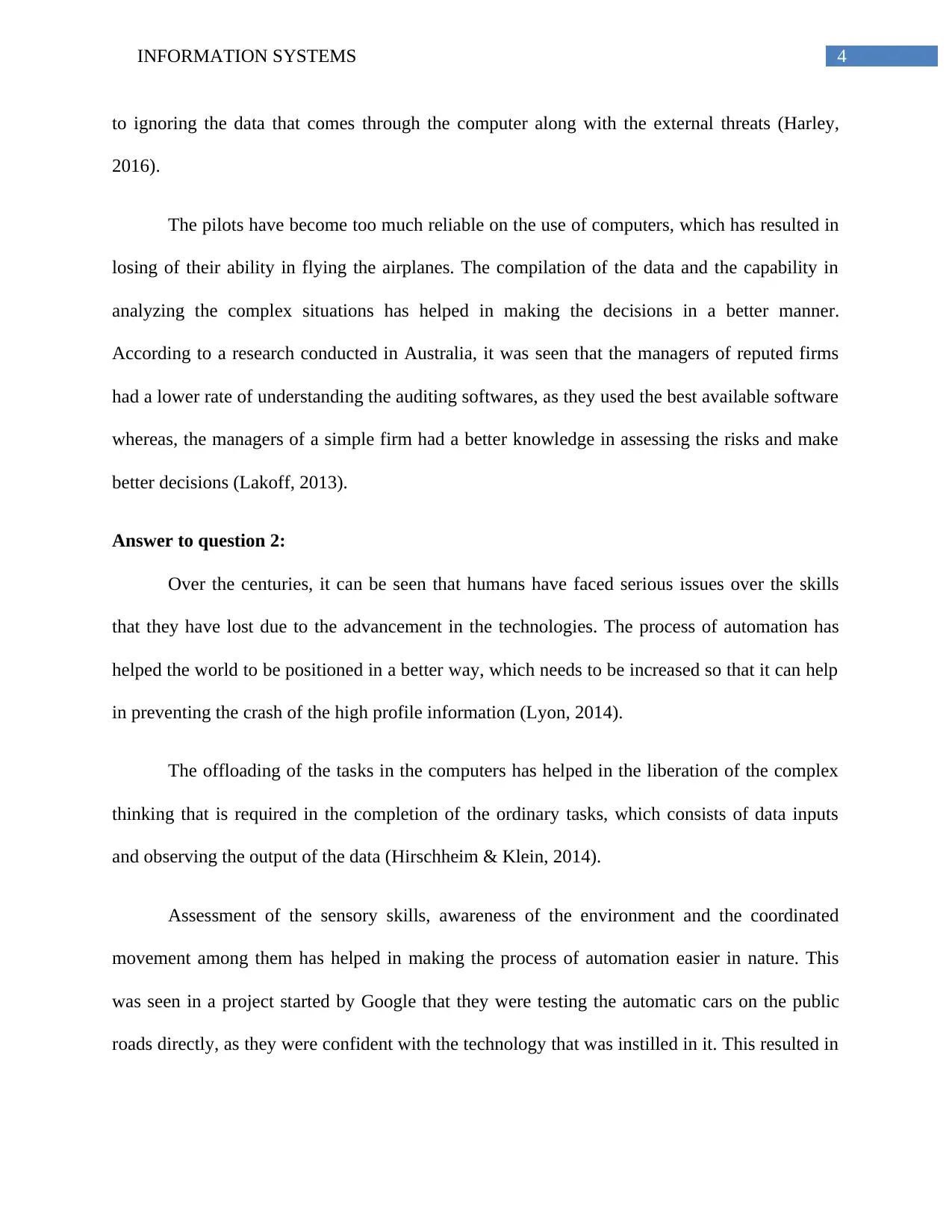
4INFORMATION SYSTEMS
to ignoring the data that comes through the computer along with the external threats (Harley,
2016).
The pilots have become too much reliable on the use of computers, which has resulted in
losing of their ability in flying the airplanes. The compilation of the data and the capability in
analyzing the complex situations has helped in making the decisions in a better manner.
According to a research conducted in Australia, it was seen that the managers of reputed firms
had a lower rate of understanding the auditing softwares, as they used the best available software
whereas, the managers of a simple firm had a better knowledge in assessing the risks and make
better decisions (Lakoff, 2013).
Answer to question 2:
Over the centuries, it can be seen that humans have faced serious issues over the skills
that they have lost due to the advancement in the technologies. The process of automation has
helped the world to be positioned in a better way, which needs to be increased so that it can help
in preventing the crash of the high profile information (Lyon, 2014).
The offloading of the tasks in the computers has helped in the liberation of the complex
thinking that is required in the completion of the ordinary tasks, which consists of data inputs
and observing the output of the data (Hirschheim & Klein, 2014).
Assessment of the sensory skills, awareness of the environment and the coordinated
movement among them has helped in making the process of automation easier in nature. This
was seen in a project started by Google that they were testing the automatic cars on the public
roads directly, as they were confident with the technology that was instilled in it. This resulted in
to ignoring the data that comes through the computer along with the external threats (Harley,
2016).
The pilots have become too much reliable on the use of computers, which has resulted in
losing of their ability in flying the airplanes. The compilation of the data and the capability in
analyzing the complex situations has helped in making the decisions in a better manner.
According to a research conducted in Australia, it was seen that the managers of reputed firms
had a lower rate of understanding the auditing softwares, as they used the best available software
whereas, the managers of a simple firm had a better knowledge in assessing the risks and make
better decisions (Lakoff, 2013).
Answer to question 2:
Over the centuries, it can be seen that humans have faced serious issues over the skills
that they have lost due to the advancement in the technologies. The process of automation has
helped the world to be positioned in a better way, which needs to be increased so that it can help
in preventing the crash of the high profile information (Lyon, 2014).
The offloading of the tasks in the computers has helped in the liberation of the complex
thinking that is required in the completion of the ordinary tasks, which consists of data inputs
and observing the output of the data (Hirschheim & Klein, 2014).
Assessment of the sensory skills, awareness of the environment and the coordinated
movement among them has helped in making the process of automation easier in nature. This
was seen in a project started by Google that they were testing the automatic cars on the public
roads directly, as they were confident with the technology that was instilled in it. This resulted in
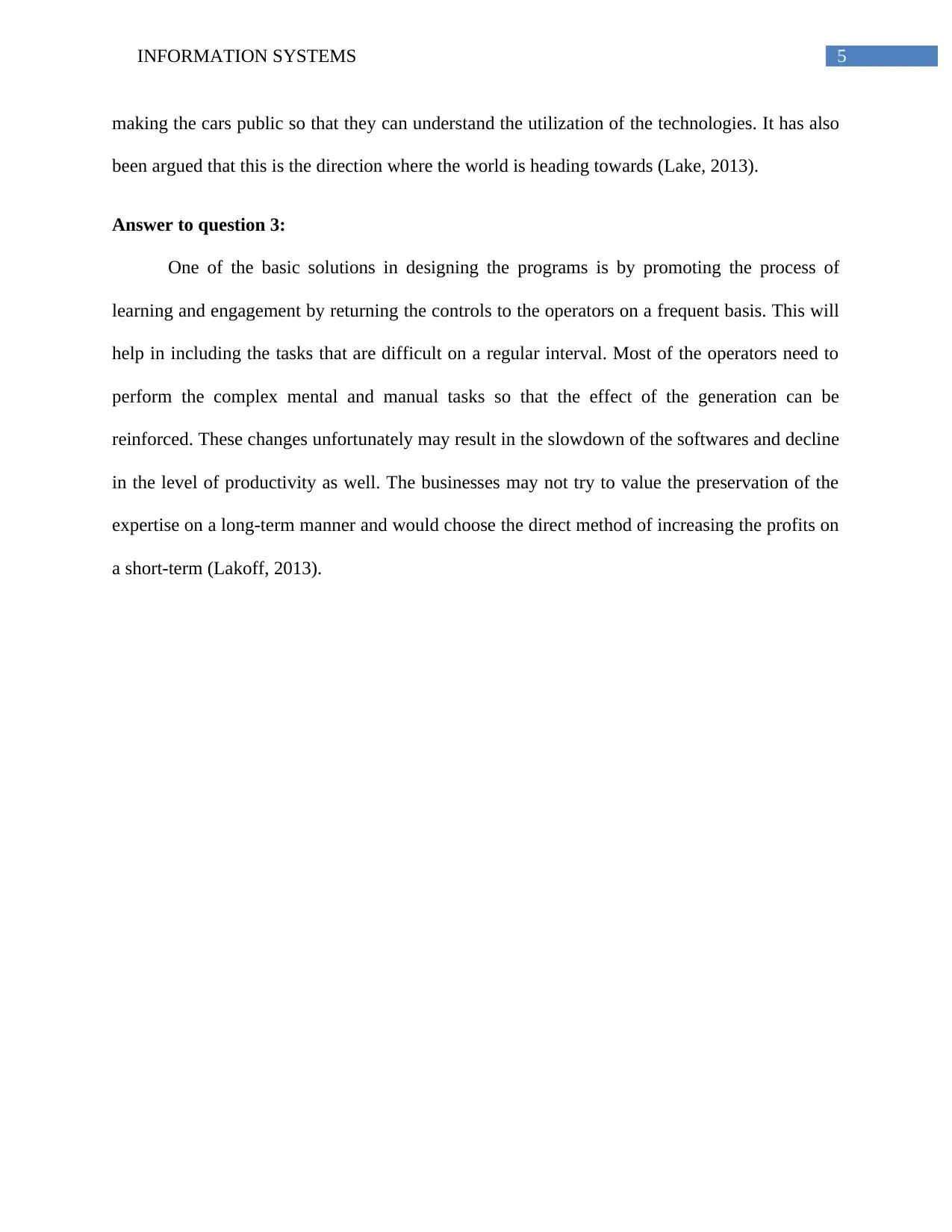
5INFORMATION SYSTEMS
making the cars public so that they can understand the utilization of the technologies. It has also
been argued that this is the direction where the world is heading towards (Lake, 2013).
Answer to question 3:
One of the basic solutions in designing the programs is by promoting the process of
learning and engagement by returning the controls to the operators on a frequent basis. This will
help in including the tasks that are difficult on a regular interval. Most of the operators need to
perform the complex mental and manual tasks so that the effect of the generation can be
reinforced. These changes unfortunately may result in the slowdown of the softwares and decline
in the level of productivity as well. The businesses may not try to value the preservation of the
expertise on a long-term manner and would choose the direct method of increasing the profits on
a short-term (Lakoff, 2013).
making the cars public so that they can understand the utilization of the technologies. It has also
been argued that this is the direction where the world is heading towards (Lake, 2013).
Answer to question 3:
One of the basic solutions in designing the programs is by promoting the process of
learning and engagement by returning the controls to the operators on a frequent basis. This will
help in including the tasks that are difficult on a regular interval. Most of the operators need to
perform the complex mental and manual tasks so that the effect of the generation can be
reinforced. These changes unfortunately may result in the slowdown of the softwares and decline
in the level of productivity as well. The businesses may not try to value the preservation of the
expertise on a long-term manner and would choose the direct method of increasing the profits on
a short-term (Lakoff, 2013).
⊘ This is a preview!⊘
Do you want full access?
Subscribe today to unlock all pages.

Trusted by 1+ million students worldwide
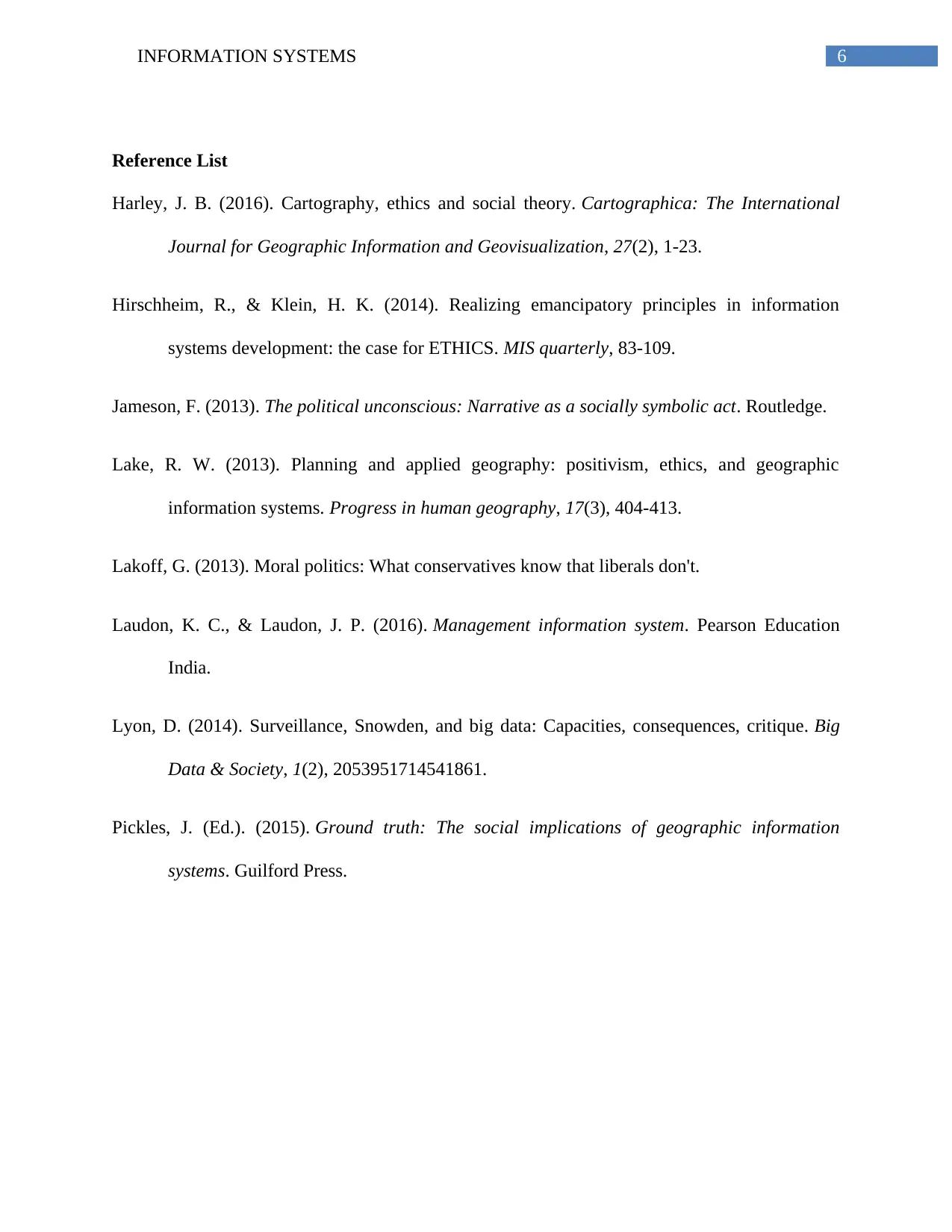
6INFORMATION SYSTEMS
Reference List
Harley, J. B. (2016). Cartography, ethics and social theory. Cartographica: The International
Journal for Geographic Information and Geovisualization, 27(2), 1-23.
Hirschheim, R., & Klein, H. K. (2014). Realizing emancipatory principles in information
systems development: the case for ETHICS. MIS quarterly, 83-109.
Jameson, F. (2013). The political unconscious: Narrative as a socially symbolic act. Routledge.
Lake, R. W. (2013). Planning and applied geography: positivism, ethics, and geographic
information systems. Progress in human geography, 17(3), 404-413.
Lakoff, G. (2013). Moral politics: What conservatives know that liberals don't.
Laudon, K. C., & Laudon, J. P. (2016). Management information system. Pearson Education
India.
Lyon, D. (2014). Surveillance, Snowden, and big data: Capacities, consequences, critique. Big
Data & Society, 1(2), 2053951714541861.
Pickles, J. (Ed.). (2015). Ground truth: The social implications of geographic information
systems. Guilford Press.
Reference List
Harley, J. B. (2016). Cartography, ethics and social theory. Cartographica: The International
Journal for Geographic Information and Geovisualization, 27(2), 1-23.
Hirschheim, R., & Klein, H. K. (2014). Realizing emancipatory principles in information
systems development: the case for ETHICS. MIS quarterly, 83-109.
Jameson, F. (2013). The political unconscious: Narrative as a socially symbolic act. Routledge.
Lake, R. W. (2013). Planning and applied geography: positivism, ethics, and geographic
information systems. Progress in human geography, 17(3), 404-413.
Lakoff, G. (2013). Moral politics: What conservatives know that liberals don't.
Laudon, K. C., & Laudon, J. P. (2016). Management information system. Pearson Education
India.
Lyon, D. (2014). Surveillance, Snowden, and big data: Capacities, consequences, critique. Big
Data & Society, 1(2), 2053951714541861.
Pickles, J. (Ed.). (2015). Ground truth: The social implications of geographic information
systems. Guilford Press.
1 out of 7
Related Documents
Your All-in-One AI-Powered Toolkit for Academic Success.
+13062052269
info@desklib.com
Available 24*7 on WhatsApp / Email
![[object Object]](/_next/static/media/star-bottom.7253800d.svg)
Unlock your academic potential
Copyright © 2020–2026 A2Z Services. All Rights Reserved. Developed and managed by ZUCOL.





